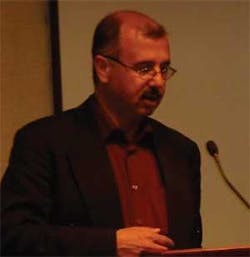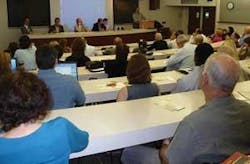Transboundary Environmental Management
By Stan Berenbaum
A recent Arava Transboundary Environmental Management seminar at UCLA focused heavily on regional water leak detection as a means of minimizing water losses in the Middle East and reducing resulting tensions over water rights.
The Arava Institute for Environmental Studies, a Middle East environmental teaching and research program, recently held a series of seminars in the United States on Transboundary Environmental Management. As president of American Leak Detection (ALD), an international franchisor and leading provider of non-invasive water and other leak detection services, I attended as a supporter and sponsor of the seminars.
The Sept. 9 seminar, held at the UCLA Law School in Los Angeles, California, USA, brought together a team of environmental management professionals from Israel, Jordan and the Palestinian Authority.
“When it comes to clean air and clean water, nature knows no borders,” says David Weisberg, executive director of Friends of the Arava Institute, the North American fundraising arm of the Arava Institute for Environmental Studies in Hevel Eilot, Israel.
The participants at the Los Angeles seminar included Clive Lipchin, Arava research director; Nader Al-Khateeb, director of the Palestinian Authority Water & Environmental Development Organization; Dr. Shmuel Brenner, Arava faculty member and former senior deputy director general of the Israeli Ministry of Environmental Protection; and Samer Talozi, associate professor in the Bioenvironmental & Irrigation Engineering Department, Jordan University of Science & Technology. The keynote speaker was Peter Gleick, co-founder and president of the Pacific Institute for Studies in Development, Environment & Security and editor of The World’s Water: The Biennial Report on Freshwater Resources.
These professionals discussed their work on cooperative water management and other environmental issues, presenting real world stories from the Middle East. They also discussed how the transboundary environmental protection model can be applied in other regions facing water scarcity, including the seminar host locations. While each speaker shared and highlighted his own personal experiences, several common themes emerged.
First, a water crisis exists throughout the world and especially in the Middle East. There is simply not enough clean water to meet current demand. In many parts of the region, including in the West Bank, Gaza and Jordan, water is rationed. At times, clean water is not supplied for weeks or even a month at a time. Water scarcity issues will only increase as populations continue to grow in the region.
Second, when water is supplied, the quality can be extremely poor. This is due to a variety of reasons including aging or inadequate infrastructure, pollution and dumping.
Third, water, like air, should be considered a basic human right. “We are all human beings,” said Al-Khateeb. “And all human beings have the right to live as equals when it comes to clean water and air.”
Fourth, while scarcity and infrastructure are real issues, the water crisis in the Middle East may not necessarily be due to these factors. Nor may the crisis necessarily be due to lack of resources or money. Rather, the real issue is a lack of proper integrated water management.
Because, as Arava says, water knows no boundaries, transbondary collaboration is essential if water and other environmental solutions are to be achieved. Given the historic conflicts in the region, though, collaboration at the state level is right now difficult if not impossible to achieve.
This, then, is the reason for Arava — the bringing together of grassroots Arab and Jewish students and leaders to solve water and other environmental problems. The Arava Institute was founded in 1996 and is situated on Kibbutz Ketura in Southern Israel, only a few miles from the borders of Egypt, Jordan, Saudi Arabia and the Red Sea.
Students live, study and work in an open community environment, where daily interaction and shared responsibility is insured. Students are trained to work across the diverse cultural, historical, ethnic and religious backgrounds of their fellow students and peoples of the Middle East. It’s hoped their collective and shared respect for clean water, air and the environment will eventually lead toward restorative health, safety and peace throughout the region.
Aside from the seminar at the UCLA Law School, additional Arava Seminars took place in September at the University of Utah Law School in Salt Lake City, Utah; Denver University in Denver, Colorado; and, the University of Colorado in Boulder, Colorado.
Addressing environmental issues on a trans-boundary basis isn’t only important in terms of protecting the environment, but hopefully it can serve as a catalyst in bringing peace to a region historically marked by conflict.
Acknowledgment: Photos in this article are from David Weisberg, executive director of Friends of the Arava Institute: www.friendsofarava.org
Author’s Note:
Stan Berenbaum is president of American Leak Detection and vice president of Franchising and Infrastructure Services at parent company PlainSight. American Leak Detection is a supporter of the Arava Institute’s efforts to address environmental issues on a trans-boundary basis. For more information on the institute, visit www.arava.org. Contact: 800-755-6697 or www.americanleakdetection.com



